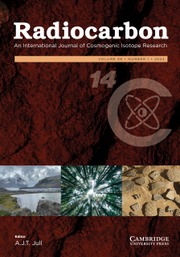Crossref Citations
This article has been cited by the following publications. This list is generated based on data provided by Crossref.
Bird, M.I.
Turney, C.S.M.
Fifield, L.K.
Smith, M.A.
Miller, G.H.
Roberts, R.G.
and
Magee, J.W.
2003.
Radiocarbon dating of organic- and carbonate-carbon in Genyornis and Dromaius eggshell using stepped combustion and stepped acidification.
Quaternary Science Reviews,
Vol. 22,
Issue. 15-17,
p.
1805.
Kandel, Andrew W.
and
Conard, Nicholas J.
2005.
Production sequences of ostrich eggshell beads and settlement dynamics in the Geelbek Dunes of the Western Cape, South Africa.
Journal of Archaeological Science,
Vol. 32,
Issue. 12,
p.
1711.
Orton, Jayson
2008.
Later Stone Age ostrich eggshell bead manufacture in the Northern Cape, South Africa.
Journal of Archaeological Science,
Vol. 35,
Issue. 7,
p.
1765.
Janz, Lisa
Elston, Robert G.
and
Burr, George S.
2009.
Dating North Asian surface assemblages with ostrich eggshell: implications for palaeoecology and extirpation.
Journal of Archaeological Science,
Vol. 36,
Issue. 9,
p.
1982.
Sadr, Karim
2009.
Marine shell dates and surface lithic assemblages on the west coast of South Africa.
Journal of Archaeological Science,
Vol. 36,
Issue. 12,
p.
2713.
Kurochkin, Evgeny N.
Kuzmin, Yaroslav V.
Antoshchenko-Olenev, Igor V.
Zabelin, Vladimir I.
Krivonogov, Sergey K.
Nohrina, Tatiana I.
Lbova, Ludmila V.
Burr, G.S.
and
Cruz, Richard J.
2010.
The timing of ostrich existence in Central Asia: AMS 14C age of eggshells from Mongolia and southern Siberia (a pilot study).
Nuclear Instruments and Methods in Physics Research Section B: Beam Interactions with Materials and Atoms,
Vol. 268,
Issue. 7-8,
p.
1091.
Dee, M.W.
Rowland, J.M.
Higham, T.F.G.
Shortland, A.J.
Brock, F.
Harris, S.A.
and
Ramsey, C. Bronk
2012.
Synchronising radiocarbon dating and the Egyptian historical chronology by improved sample selection.
Antiquity,
Vol. 86,
Issue. 333,
p.
868.
Wuttmann, Michel
Briois, François
Midant-Reynes, Béatrix
and
Dachy, Tiphaine
2012.
Dating the End of the Neolithic in an Eastern Sahara Oasis: Modeling Absolute Chronology.
Radiocarbon,
Vol. 54,
Issue. 3-4,
p.
305.
Wengrow, David
Dee, Michael
Foster, Sarah
Stevenson, Alice
and
Ramsey, Christopher Bronk
2014.
Cultural convergence in the Neolithic of the Nile Valley: a prehistoric perspective on Egypt's place in Africa.
Antiquity,
Vol. 88,
Issue. 339,
p.
95.
Miller, Jennifer Midori
and
Willoughby, Pamela Rae
2014.
Radiometrically dated ostrich eggshell beads from the Middle and Later Stone Age of Magubike Rockshelter, southern Tanzania.
Journal of Human Evolution,
Vol. 74,
Issue. ,
p.
118.
Tryon, Christian A.
Crevecoeur, Isabelle
Faith, J. Tyler
Ekshtain, Ravid
Nivens, Joelle
Patterson, David
Mbua, Emma N.
and
Spoor, Fred
2015.
Late Pleistocene age and archaeological context for the hominin calvaria from GvJm-22 (Lukenya Hill, Kenya).
Proceedings of the National Academy of Sciences,
Vol. 112,
Issue. 9,
p.
2682.
Janz, Lisa
Feathers, James K.
and
Burr, George S.
2015.
Dating surface assemblages using pottery and eggshell: assessing radiocarbon and luminescence techniques in Northeast Asia.
Journal of Archaeological Science,
Vol. 57,
Issue. ,
p.
119.
Dewar, Genevieve
and
Stewart, Brian A.
2016.
Africa from MIS 6-2.
p.
195.
Falconer, Steven E
and
Fall, Patricia L
2016.
A Radiocarbon Sequence from Tell Abu en-Ni‘aj, Jordan and its Implications for Early Bronze IV Chronology in the Southern Levant.
Radiocarbon,
Vol. 58,
Issue. 3,
p.
615.
Mulazzani, Simone
Belhouchet, Lotfi
Salanova, Laure
Aouadi, Nabiha
Dridi, Yosra
Eddargach, Wassel
Morales, Jacob
Tombret, Olivier
Zazzo, Antoine
and
Zoughlami, Jamel
2016.
The emergence of the Neolithic in North Africa: A new model for the Eastern Maghreb.
Quaternary International,
Vol. 410,
Issue. ,
p.
123.
Wright, David K.
2017.
Accuracy vs. Precision: Understanding Potential Errors from Radiocarbon Dating on African Landscapes.
African Archaeological Review,
Vol. 34,
Issue. 3,
p.
303.
Dewar, Genevieve
and
Stewart, Brian A.
2017.
Early Maritime Desert Dwellers in Namaqualand, South Africa: A Holocene Perspective on Pleistocene Peopling.
The Journal of Island and Coastal Archaeology,
Vol. 12,
Issue. 1,
p.
44.
Tryon, Christian A.
Lewis, Jason E.
Ranhorn, Kathryn L.
Kwekason, Amandus
Alex, Bridget
Laird, Myra F.
Marean, Curtis W.
Niespolo, Elizabeth
Nivens, Joelle
Mabulla, Audax Z. P.
and
Petraglia, Michael D.
2018.
Middle and Later Stone Age chronology of Kisese II rockshelter (UNESCO World Heritage Kondoa Rock-Art Sites), Tanzania.
PLOS ONE,
Vol. 13,
Issue. 2,
p.
e0192029.
Finkelstein, Israel
Adams, Matthew J.
Dunseth, Zachary C.
and
Shahack-Gross, Ruth
2018.
The Archaeology and History of the Negev and Neighbouring Areas in the Third Millennium BCE: A New Paradigm.
Tel Aviv,
Vol. 45,
Issue. 1,
p.
63.
Jones, Mica B.
Brandt, Steven A.
and
Marshall, Fiona
2018.
Hunter-gatherer reliance on inselbergs, big game, and dwarf antelope at the Rifle Range Site, Buur Hakaba, southern Somalia ∼20,000−5,000 BP.
Quaternary International,
Vol. 471,
Issue. ,
p.
55.


